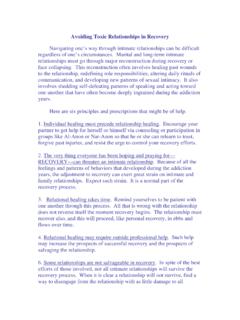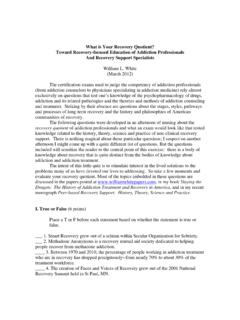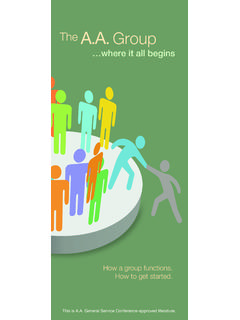Transcription of Keywords Calls Provided by Pre- Professional …
1 CentralJournal of Substance Abuse & AlcoholismCite this article: Garner BR, Godley MD, Passetti LL, Funk RR, White WL (2014) Recovery Support for Adolescents with Substance use Disorders: The Impact of Recovery Support telephone Calls Provided by Pre- Professional Volunteers. J Subst Abuse Alcohol 2(2): 1010.*Corresponding authorBryan R Garner, Chestnut Health Systems, 448 Wylie Drive, Normal, IL 61761, USA, Email: 20 December 2013 Accepted: 07 February 2014 Published: 18 February 2014 Copyright 2014 Garner et al. OPEN ACCESS Research ArticleRecovery Support for Adolescents with Substance use Disorders: The Impact of Recovery Support telephone Calls Provided by Pre- Professional VolunteersBryan R Garner*, Mark D Godley, Lora L Passetti, Rodney R Funk and William L WhiteChestnut Health Systems, USA INTRODUCTIONA lthough research has identified effective interventions for the treatment of adolescent substance use disorders and related problems [1-4], research also has shown relapse and continued substance use are common following discharge from treatment [5-7].
2 These findings combined with longer-term findings with adults [8-10] have prompted increasing recognition that substance use disorders can be a chronic condition requiring long-term treatment and support similar to other chronic conditions such as mental illness, hypertension, diabetes, and congestive heart failure [11-15]. One approach to the long-term care of substance use problems that has received considerable research attention is known as continuing care (historically referred to as aftercare ). Although reviews of the continuing care research have revealed mixed support for the effectiveness of continuing care [16-18], a recent meta-analytic review of continuing care for substance use disorders found that continuing care had a significant positive effect at both the end of the continuing care interventions (g = .19) and at follow-up (g = .27) [18].Despite demonstrated support for the effectiveness of continuing care approaches, broader dissemination and implementation of evidence-based continuing care services within practice settings remains limited [19,20].
3 While additional research to more fully understand the barriers to greater Keywords Adolescent Recovery support Substance use VolunteersAbstractThe present quasi-experiment examined the direct and indirect effects of recovery support telephone Calls following adolescent substance use disorder treatment. Six-month outcome data from 202 adolescents who had received recovery support Calls from primarily pre- Professional ( , college-level social service students) volunteers was compared to 6-month outcome data from a matched comparison sample of adolescents (n = 404). Results suggested adolescents in the recovery support sample had significantly greater reductions in their recovery environment risk relative to the comparison sample ( = ). Path analysis also suggested that the reduction in recovery environment risk produced by recovery support Calls had indirect impacts (via recovery environment risk) on reductions in social risk ( =.)
4 22), substance use ( = .23), and substance-related problems ( = .16). Finally, moderation analyses suggested the effects of recovery support Calls did not differ by gender, but were significantly greater for adolescents with lower levels of treatment readiness. In addition to providing rare empirical support for the effectiveness of recovery support services, an important contribution of this study is that it provides evidence that recovery support services do not necessarily have to be peer-based, at least in terms of the recovery support service provider having the experiential credentials of being in recovery. If replicated, this latter finding may have particularly important implications for helping increase the recovery support et al. (2014)Email: J Subst Abuse Alcohol 2(2): 1010 (2014) 2/11implementation of evidence-based continuing care services within real-world settings is clearly needed, cost and accessibility have been two common concerns.
5 To decrease associated costs ( , travel to client homes) and increase accessibility of continuing care services, research has increasingly focused on the potential effectiveness of providing continuing care services via the telephone [21-31]. Similar to the general continuing care literature, research support for the effectiveness of telephone -based continuing care appears to be equivocal [21-23,25-28,30,31]. Thus, further research is needed to better understand factors associated with effective telephone -based continuing approach to the long-term care of substance use disorders is recovery support. In contrast to professionally delivered continuing care approaches, recovery support has been defined as the process of giving and receiving non- Professional , non-clinical assistance to achieve long-term recovery from severe alcohol and/or other drug-related problems [32]. Recovery support via participation in secular, spiritual, or religious recovery mutual-aid societies ( , SMART Recovery, Alcoholics Anonymous (AA), Narcotics Anonymous (NA), Celebrate Recovery) or other recovery community institutions ( , recovery community centers, recovery social clubs, recovery homes, recovery schools) has a long and rich history [32].
6 Of particular import for those serving substance-involved adolescents is the growth of support structures specifically for youth ( , young people s AA and NA meetings, Teen Addiction Anonymous) and youth-led or youth-focused recovery advocacy organizations ( , Young People in Recovery, Transforming Youth Recovery). Consistent with the increasing frequency of continuing care delivered via the telephone , there also has been increasing use of the telephone to deliver recovery support services. For example, as described by Valentine [33], in 2009, the Connecticut Community for Addiction Recovery (CCAR) made 36,865 outbound support Calls to 1,420 recovering individuals. Particularly noteworthy is that although the equivalent of approximately $380,000 in services were Provided , the actual cost to CCAR was limited primarily to costs associated with paid staff time spent recruiting, training, coordinating, and supervising volunteers. Given the minimal costs associated with providing recovery support by volunteers, this appears to be a promising approach.
7 To date, however, examinations of the effectiveness of recovery support services via experimental tests have been limited and focused on recovery support services for adults [32,34-36].Recovery support delivered by the groups and organizations noted above ( , recovery mutual aid groups, recovery social clubs, recovery homes, recovery schools) are commonly Provided by other individuals who are in recovery. As such, these types of recovery support services are often more specifically referred to as peer-based recovery support [32]. Although research has found service provider recovery status to have a significant positive relationship with client perceptions of credibility [37], therapeutic relationship [38], and treatment satisfaction [39], research has not generally supported service provider recovery status as being significantly associated with client substance use outcomes [40-43]. These latter findings, combined with other research supporting the use of non-professionals to address substance use disorders [44-46], has raised questions about the extent to which recovery support services could be Provided effectively by non- Professional individuals who do not identify as being in recovery.
8 In order to help address this important question, the current paper conducted a quasi-experimental examination of the direct and indirect effects of recovery support telephone Calls following adolescent substance use disorder treatment, as delivered by mostly pre- Professional ( , college-level social service students) volunteers, the majority [75%] of whom did not identify themselves as being in recovery. We hypothesized that relative to a matched comparison sample, adolescents receiving the recovery support telephone Calls would report greater post-treatment reductions in recovery environment risk, social risk, substance use, and substance-related problems. Additionally, based on prior research [47,48], we hypothesized that the impact of the recovery support telephone Calls on substance use and substance-related problems would be mediated by reductions in recovery environment risk and social risk (see Figure 1). Finally, based on research that has found gender [27,49-51] and readiness to change [27,51] to be important moderators of continuing care interventions, we hypothesized that the effects of the recovery support telephone Calls would be significantly greater for females and for individuals reporting lower levels of treatment contextIn 2009, the Substance Abuse and Mental Health Services Administration s Center for Substance Abuse Treatment (SAMHSA/CSAT) funded an innovative project called Recovery Support for Adolescents and Families (RSAF).
9 The primary goal of this project was to provide recovery support services to adolescents and their families following episodes of outpatient or residential substance use disorder treatment. The project included four adolescent substance use disorder treatment providers located in Bloomington, IL, Fitchburg, MA, Seattle, WA, and Tucson, AZ. ParticipantsTwo hundred and two adolescents (94% of the 215 eligible adolescents) were recruited to participate in the project. In order to be eligible for the project, adolescents must have: a) been 13-18 years of age at the time of recruitment, b) met DSM-IV-TR diagnostic criteria for substance abuse or dependence, c) been enrolled and remained in either outpatient treatment for at least 4 sessions within 44 days from the intake session or in residential treatment for at least 2 weeks, d) resided in one of the four respective RSAF project catchment areas, and e) had telephone access either at their home or another location.
10 Additionally, adolescents were excluded from the project if they met any of the following exclusion criteria: a) showed evidence of a psychotic or organic state of sufficient severity to interfere with understanding of project instruments, project procedures, or the informed consent process, b) were deemed an imminent danger to self or others, c) were a ward of child protective services, or d) CentralGarner et al. (2014)Email: J Subst Abuse Alcohol 2(2): 1010 (2014) 3/11 Figure 1 Hypothesixed scheduled to enter a state juvenile justice or correctional system institution within 3 months of recruitment. All project procedures were conducted under the auspices of Chestnut Health Systems Institutional Review Board. Recovery support volunteersSixty project volunteers, who were primarily recruited from local university undergraduate and graduate social work and nursing programs, were included as part of the current study. The average volunteer age was 29 years, with approximately half (n=29) between the ages of 17 and 22.















